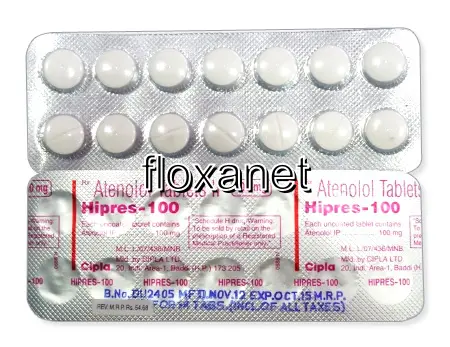| Package | Dosage | Price | Price per Dose | |
|---|---|---|---|---|
| Dosage: 25mg | ||||
| 350 pill | 25mg | $213.74 | $0.61 | |
| 140 pill | 25mg | $97.15 | $0.69 | |
| 84 pill | 25mg | $61.06 | $0.74 | |
| 56 pill | 25mg | $43.01 | $0.76 | |
| 28 pill | 25mg | $24.97 | $0.87 | |
| 14 pill | 25mg | $12.48 | $0.93 | |
| Dosage: 50mg | ||||
| 350 pill | 50mg | $252.60 | $0.72 | |
| 140 pill | 50mg | $106.86 | $0.76 | |
| 98 pill | 50mg | $80.49 | $0.83 | |
| 84 pill | 50mg | $76.33 | $0.90 | |
| 56 pill | 50mg | $48.57 | $0.87 | |
| 28 pill | 50mg | $29.13 | $1.04 | |
| 14 pill | 50mg | $15.25 | $1.11 | |
| Dosage: 100mg | ||||
| 350 pill | 100mg | $248.44 | $0.71 | |
| 140 pill | 100mg | $122.13 | $0.87 | |
| 84 pill | 100mg | $88.82 | $1.05 | |
| 56 pill | 100mg | $63.83 | $1.14 | |
| 28 pill | 100mg | $33.30 | $1.21 | |
| 14 pill | 100mg | $18.03 | $1.25 | |

Atenolol Description
Introduction to Atenolol
Atenolol is a widely used medication in the treatment of cardiovascular conditions. It belongs to a class of drugs known as beta-blockers, which primarily work by blocking the effects of adrenaline on the heart. This action leads to a reduction in heart rate, blood pressure, and the overall workload on the heart. Atenolol is commonly prescribed for managing high blood pressure (hypertension), angina (chest pain), and to prevent future heart attacks.
How Atenolol Works
The medication works by selectively blocking beta-1 adrenergic receptors located in the heart and kidneys. By doing so, it decreases the amount of work the heart has to do and lowers the oxygen demand of the heart muscle. This results in a more stable heartbeat and helps prevent episodes of chest pain and irregular heart rhythms. Importantly, Atenolol’s selectivity minimizes its impact on beta-2 receptors found in the lungs, thus reducing the likelihood of respiratory side effects compared to non-selective beta-blockers.
Benefits of Using Atenolol
Many patients experience significant benefits from using Atenolol. It effectively lowers blood pressure, which is crucial in preventing strokes, kidney damage, and other complications related to hypertension. For people with angina, Atenolol helps prevent chest pain episodes by reducing the heart's oxygen needs. It also aids in the prevention of second heart attacks and supports overall cardiac health. Because of its selectivity, it is often preferred for patients who need cardiovascular protection but have respiratory concerns.
Potential Side Effects
While Atenolol is generally well tolerated, some users may experience side effects. Common issues include tiredness, dizziness, cold hands and feet, and gastrointestinal discomfort. Less frequently, some individuals may experience sleep disturbances or mood changes. It’s important for users to report any unusual symptoms to their healthcare provider. Rare but serious side effects could include a significant drop in blood pressure, slow heart rate, or breathing difficulties, especially in those with pre-existing lung conditions.
Precautions and Considerations
Before starting Atenolol, patients should disclose their full medical history, especially if they have asthma, diabetes, or heart failure. Since Atenolol can mask the symptoms of low blood sugar, diabetics need to monitor their blood sugar levels carefully. Pregnant and breastfeeding women should consult with their healthcare provider to weigh potential risks and benefits. Regular medical check-ups are essential to monitor the medication's effectiveness and any adverse effects.
Usage and Dosage
Atenolol is available in various strengths and formulations. The dosage depends on the condition being treated, the patient’s age, and response to therapy. Typically, treatment begins with a low dose, gradually adjusted under medical supervision. It is usually taken once or twice daily, with or without food. Consistency is key; patients should follow their prescribed schedule strictly and not stop the medication suddenly without consulting their doctor.
Conclusion
Overall, Atenolol remains a reliable choice for managing several cardiac conditions. Its selective action makes it a favorable option for many patients needing blood pressure control and angina relief. However, like all medications, it requires careful monitoring by a healthcare provider to minimize risks and optimize benefits. Patients should adhere to their prescribed regimen and communicate any concerns or side effects experienced during treatment.
